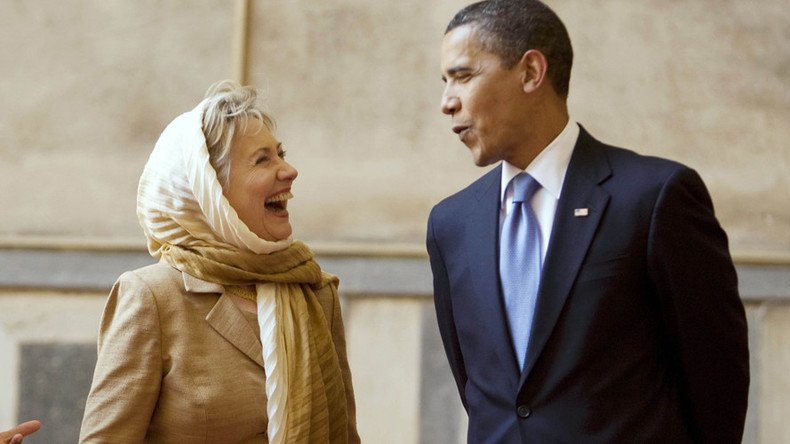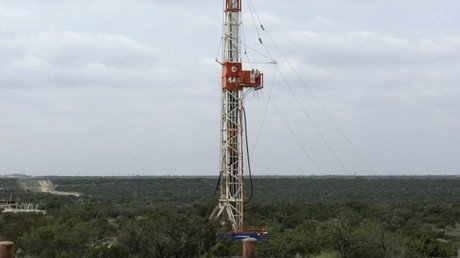This week’s decision by a federal judge to strike down the Obama administration's efforts to regulate, but not ban, fracking on federal lands overshadows the enthusiastic support from the president, Hillary Clinton, and the Democratic party for what eco-activists call the "rape" of Mother Nature.
Judge Scott Skavdahl, an Obama appointee, ruled in favor of the industry groups and western states who have made billions from the controversial technique in recent years and argued Congress had forbid the Department of Interior from regulating it in 2005.
“Congress has not delegated to the Department of Interior the authority to regulate hydraulic fracturing,” Skavdahl said. “The [Bureau of Land Management’s] effort to do so through the Fracking Rule is in excess of its statutory authority and contrary to law.”
This is the second time that judge blocked executive branch rules after issuing an injunction last September to stop the Interior Department from implementing safety measures.
The court ruled that federal regulation was creating an overlap and interfering with “the state’s sovereign interests,” while ignoring the interests of residents near fracking sites who suffer from flaming water and other dangerous side effects of drilling into the earth with chemicals.
The Obama administration was sued by oil and gas lobbyists like the Western Energy Alliance and the Independent Petroleum Association of America, even though the industry has donated millions to his presidential campaigns, the Democratic party, Hillary Clinton, and the foundation she started with her husband Bill.
The rules applied only to federal and tribal land, despite the fact that the vast majority of fracking takes place on private and state land, the New York Times reports, thanks in part to governors from both parties who support fracking and a push to privatize federal land led by the Fox News Channel, the "Bundy Gang" and the Koch Brothers.
What is fracking and why do environmentalists oppose it?
The chemicals used in fracking are ‘secretive’ and companies refuse to disclose their ingredients.
What we do know are the effects include pollution of groundwater, earthquakes, low birth weights, and the release of dangerous methane gas, the second most emitted gas from the US after carbon dioxide.
“Pound for pound”, however, methane is more damaging to the environment than CO2, with an impact on climate change “more than 25 times greater over a 100 year period,” the US Environmental Protection Agency reports.
Recent estimates revealed methane levels from fracking were “radically higher” than previously estimated, by about 27 percent.
The administration announced new regulations in May to cut methane levels, aiming to reduce them by 40-45 percent by 2025. In order to achieve this, companies would have to capture gas and stop leaks in pipes, the Guardian reports, but the rules would only apply to new and “modified” facilities.
Republicans in Congress are trying to cut the EPA’s budget, blocking its ability to move forward with regulations.
“The number and outrageous nature of the riders in this bill pander to special interests at the expense of the public good,” Congresswoman Betty McCollum (D-MN) said.
Republican Hal Rogers, head of the Appropriations Committee behind the cuts, said, “The EPA’s regulatory agenda is not working, certainly not for coal mining communities, American businesses and industries, or for hard-working Americans who rely on having good jobs and reasonable energy bills to take care of their families.”
Fracking requires massive amounts of water, an average of “44 billion gallons of water a year in 2011 and 2012,” and ends up polluting the supply.
The Environmental Protection Agency conducted an assessment on the effects of hydraulic fracturing on drinking water in 2015.
“Some residents living close to oil and gas production wells have reported changes in the quality of drinking water and assert that hydraulic fracturing is responsible for these changes,” the EPA wrote in its study. “Other concerns include competition for water between hydraulic fracturing activities and other water users, especially in areas of the country experiencing drought, and the disposal of wastewater generated from hydraulic fracturing.”
Water was examined at each stage of fracking - from acquisition to chemical mixing, injection, waste treatment, and disposal - and found both above and below ground mechanisms “have the potential to impact drinking water resources.”
Water shortages, fracking water spills, “fracking directly into underground drinking water resources, below ground migration of liquids and gases, and inadequate treatment and discharge of water,” were all cited as dangers.
While those close to fracking sites carry the highest risk of contamination, “hydraulic fracturing can also affect drinking water resources outside the immediate vicinity of a hydraulically fractured well; a truck carrying wastewater could spill or a release of inadequately treated wastewater could have downstream effects.”
A US Geological Survey test of Wolf Creek near a wastewater storage site in Lochgelly, West Virginia found fracking chemicals downstream like “barium, bromide, calcium, chloride, sodium, lithium, [and] strontium” and microbes that had been “dramatically altered,” the Post Gazette reports.
Obama’s fracking record
Even though the president has earned the “wrath” of environmentalists, he’s managed to keep the “green” base of the Democratic party satisfied, at least to the extent that they support his potential successor Clinton in the upcoming election rather than anti-fracking Green Party candidate Jill Stein.
This is despite ‘boasting’ about increasing pollution during his 2013 State of the Union speech.
“We produce more oil at home than we have in 15 years,” he noted, adding “We have doubled the distance our cars will go on a gallon of gas.”
Obama received almost $2 million in direct contributions from the oil and gas industry during his 2008 and 2012 campaigns - and he rewarded the industry’s investment in him with a huge shift away from foreign oil dependence to domestic sources, resulting in a now-waning“boom” of jobs, more pollution, and challenging economic problems for oil-producing nations.
He’s also used a Republican linguistic trick by touting oil as part of his "clean" energy plan, using it as a “bridge fuel” to wean the world off more harmful fossil fuels.
Hillary Clinton
Hailed as the person who “brought fracking to the world” as secretary of state under Obama, Clinton has accepted almost $7 million from the oil & gas industry for her 2016 campaign. This includes donations from lobbyists, company employees, and Super PACs that funnel money to Democrats.
As America’s top diplomat, Clinton’s support of fracking was "part of a broader push to fight climate change, boost global energy supply, and undercut the power of adversaries such as Russia that use their energy resources as a cudgel," according to an investigation by Mother Jones published in 2014.
The fact-checking site Politifact found instances of Clinton and her State Department “talking up fracking to Latin America, the European Union, Poland, Lithuania, Latvia, Bulgaria, Pakistan, China and India.”
"The United States will promote the use of shale gas. Now, I know that in some places is controversial. But natural gas is the cleanest fossil fuel available for power generation today, and a number of countries in the Americas may have shale gas resources," Clinton claimed in a 2009 speech in front of the Inter-American Development Bank.
More recently, she attended a gala fundraiser in January held by fossil-fuel industry investors Franklin Square Capital Partners, although just in time for the Democratic primary season, she claimed to be against fracking under certain circumstances.
“I don’t support it when any locality or any state, is against it, number one,” Clinton said during a March debate in Flint, Michigan, a city struggling with its own poisoned water supply. “I don’t support it when the release of methane or contamination of water is present. I don’t support it, number three, unless we can require that anybody who fracks has to tell us exactly what chemicals they are using.”
Pro-fracking Democrats
Obama’s Interior Secretary Sally Jewell, a former ExxonMobil employee, supports fracking even though she claims to love nature and previously served as CEO of REI, the outdoor equipment cooperative.
These contradictions extend to her aim to “reform oil and gas permitting so that industry gets permission faster, while underwriting environmental impact evaluations and inspections Interior can’t afford,” Bloomberg reports.
A number of Democrats fought hard to stop Colorado from implementing limits on fracking and a rule preventing companies from building facilities too close to homes, the Intercept reports.
The group deceptively called ‘Protecting Colorado’s Environment, Economy, and Energy Independence’ raised over $6 million from oil companies like Anadarko Petroleum, which donated to Congressional Democrats Henry Cuellar and Michael Bennet this year - as well as the Clinton Foundation in 2014.
The industry managed to stop two rules in Longmont and Fort Collins, with the Supreme Court ruling in their favor.
Former Democratic Governor of Montana, Brian Schweitzer, is aligned with Bernie Sanders on many issues - from single payer healthcare to criticism of the military industrial complex - but he also fought against the Bureau of Land Management’s efforts to regulate fracking.
In 2012, the trained soil scientist disputed claims that fracking contaminates water, writing, “We have had no cases of groundwater contamination reported, discovered, or even suspected,” and has framed fracking as a way to cut dependence on the Middle East.
Schweitzer also supported the controversial Keystone Pipeline, but earned some green credentials by backing renewable energy tax credits and a goal of 25 percent renewable energy by 2025.
Former Pennsylvania Governor Ed Rendell, the Clinton surrogate who made “sexist” comments during the primary campaign, has an ugly record on fracking.
After making the Keystone State one of the biggest frackers in the country, he wrote an op-ed in favor of fracking in 2013, calling on New Yorkers to embrace it, and was a paid consultant with a private equity firm which invests in natural gas.
US Senate hopeful Katie McGinty, a former environmental advisor to Bill Clinton and former head of Pennsylvania's Dept of Environmental Protection, is facing attacks for her ties to oil and gas companies.
McGinty claims to support green energy, but takes money from executives and employees of the oil and gas industry, amounting to $20,000 in one quarter of 2015.
Climate activists have called for a fracking ban on the DNC platform, delivering more than 90,000 signatures earlier this month. They pointed to the more than 137,000 wells which have been opened since 2005.
"The Democratic Party has been complicit in the US fracking boom which is poisoning communities and our climate," said Emily Wurth of Food & Water Watch. "Any serious plan to combat climate change must include a ban on fracking, and as the committee develops the platform, they should heed the calls of the growing movement to ban fracking and keep fossil fuels in the ground."
Since 1990, Democrats have received $83 million from the oil & gas industry in direct donations, part of the nearly half a billion given to both parties in the past 26 years through PACs and "soft money."
That doesn't even count the money spent to influence state and local level elected officials, where much of the lobbying happens.
Among the states to embrace fracking are Ohio, Oklahoma, North Dakota, Pennsylvania, West Virginia, and Wyoming while only Maryland, New York, and New Jersey have managed to resist it.


